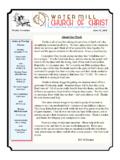Transcription of The New Testament - faithfulbible.com
1 The New Testament A Faithful Translation c 2009 William Zeitler Copyright ii Terms of Use You are free to make and distribute copies of the Faithful New Testament . There are two conditions, however: 1. You may not sell or charge for the copies in any way. You are welcome to quote from the Faithful New Testament , as long as you credit the source. ( Faithful New Testament at ). 2. You can't modify or repackage the Faithful New Testament in any way, or any portion of it. You must give it away complete, and unmodified. You especially can't change the copyright. October 20, 2009. ii Contents The Gospel according to Matthew .. 1. The Gospel according to Mark.
2 50. The Gospel according to Luke .. 79. The Gospel according to John .. 128. The Acts of the Apostles .. 168. The Epistle to the Romans .. 208. The First Epistle to the Corinthians .. 225. The Second Epistle to the Corinthians .. 241. The Epistle to the Galatians .. 251. The Epistle to the Ephesians .. 256. The Epistle to the Philippians .. 262. The Epistle to the Colossians .. 266. The First Epistle to the Thessalonians .. 270. The Second Epistle to the Thessalonians .. 274. The First Epistle to Timothy .. 276. The Second Epistle to Timothy .. 281. The Epistle to Titus .. 284. The Epistle to Philemon .. 286. The Epistle to the Hebrews .. 287. The Epistle of James.
3 301. The First Epistle of Peter .. 306. The Second Epistle of Peter .. 311. The First Epistle of John .. 314. The Second Epistle of John .. 319. The Third Epistle of John .. 320. The Epistle of Jude .. 321. The Book of Revelations .. 323. A Bibliography 343. iii iv CONTENTS. Preface The Translation As anyone who has studied a foreign language or a foreign culture knows, different peoples have subtly different ways of viewing the world, and many of these differences are embodied in their languages. Because of this, the translation process is essentially an attempt to reconcile these differences. Inevitably a translation is a compromise. Languages do not correspond one-to-one.
4 Virtually all of the great translations of the New Testament take the approach of making the sense of the Original fit ordinary English (or what was at the time ordinary or proper English). This is certainly the best approach for a general-purpose translation. The Faithful New Testament tries to complement this approach with a translation in which English is used just a little creatively to better convey the sense of the Original. The result, of course, is that the English is a little more awkward. Consequently, The Faithful New Testament may not be the best choice for quoting scripture passages in public worship, for example. In fact, we think the best way to use The Faithful New Testament is alongside your favorite translation as a study aid to see more of the detail and power of the Original.
5 Example 1. English uses the one word love for an enormous variety of types of love; the Greek dis- tinguishes them by using different words. The two principle words for love used in the New Testament : are agape ( ah-GAH-pay ) and philia ( fi-LEE-ah ), and the Faithful New Testament translates them as agape-love and philia-love respectively. Some Bible expositors teach that agape-love is God's Love and philia-love is Man's Love . But consider: Men agape-loved the darkness rather than the light, for their works were perni- cious. (John 3:19, Faithful New Testament ). How can you have God's love for the darkness? And Paul says If anyone does not philia-love the lord, let him be accursed.
6 (I Cor. 16:22, Faithful New Testament ). This would seem to indicate that philia-love is as important as agape-love. In our view, the difference between agape-love and philia-love is along the lines of the difference between love as commitment and love as feeling . But you don't have to take our word for it: the Faithful New Testament enables the English reader to know immediately which of these two words for love is used in any passage, which ultimately is the decisive way to understand the different meanings. Making clear the different Greek words for love in the English sometimes dramatically clarifies otherwise confusing passages. For example, in the following passage, the resur- rected Jesus is talking to Peter, who had so recently denied Jesus three times (bold is added): v vi CONTENTS.
7 King James: So when they had dined, Jesus saith to Simon Peter, Simon, son of Jonas, lovest thou Me more than these? He saith unto Him, Yes, Lord; Thou knowest that I love Thee. He saith unto him, Feed my lambs. (16) He saith to him again the second time, Simon, son of Jonas, lovest thou Me? He saith unto Him, Yes, Lord, Though knowest that I love Thee. He saith unto him, Feed My sheep. (17) He saith unto him the third time, Simon, son of Jonas, lovest thou Me? Peter was grieved because He said unto him the third time, Lovest thou Me? and he said unto Him, Lord Thou knowest all things;. Thou knowest that I loveth Thee. Jesus saith unto him, Feed My sheep.
8 (John 21: 15-17). Faithful New Testament : When therefore they ate breakfast, Jesus says to Simon Peter: Simon son of John, do you agape-love me more than these? He says to them: Yes, Lord, you know that I philia-love you. He says to him: Be feeding my lambs. (16) He says to him again a second time: Simon son of John, do you agape-love me? He says to him: Yes Lord, you know that I philia-love you. He says to him: Be shepherding my sheep. (17) He says to him the third time: Simon Peter, do you philia-love me? Peter was grieved because he said to him the third time: Do you philia-love me? And he said to him: You know everything, you know that I philia-love you.
9 Jesus says to him: Be feeding my sheep. (John 21: 15-17). The first two times Jesus asks Peter if he agape-loves Him, Peter replies that he philia- loves Him; the third time when Jesus asks Peter if philia-loves Him (which Peter had already said twice that he does), Peter is upset. It's interesting that Jesus questions Peter three times the same number of times that Peter had denied Him. Example 2. To a surprising degree, translators sometimes pass over details of the meaning of the Orig- inal unnecessarily (in our view). For example, the phrase the kingdom of heaven, which appears so frequently in Matthew's gospel, is not singular, it's plural: :3: Blessed are the poor in the spirit For theirs is the kingdom of the heavens.
10 Faithful New Testament Blessed are the poor in the spirit for theirs is the kingdom of heaven. King James Blessed are the poor in the spirit For theirs is the kingdom of heaven. RSV. Blessed are the poor in the spirit For theirs is the kingdom of heaven. NASB. But in other passages, the New Testament uses heaven singular, such as in the Lord's Prayer: Your kingdom come, your will come to pass, as in [heaven], so also on [the] earth. ( :10). The Faithful New Testament takes the position that details in the Original like singular and plural should be translated literally as much as possible especially when they can be translated by perfectly normal English so English readers can assess the significance for themselves.



